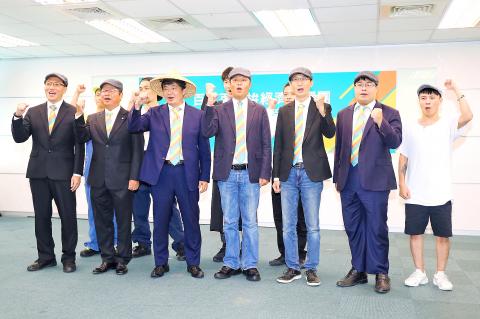The Democratic Progressive Party (DPP) yesterday announced the establishment of a new campaign unit to stump on economic issues in the run-up to the Nov. 24 nine-in-one elections.
At a news conference at its headquarters in Taipei, DPP Secretary-General Hung Yao-fu (洪耀福) said that the party has accomplished much in improving the economy, and sharing the fruits of that growth is an important objective of the party.
The DPP platform is defined by reform and creating an economy that will make Taiwan a more equitable, rich and powerful country, he said, adding that improved wages and tax cuts are thanks to the government.

Photo: CNA
Members of the unit are to travel throughout the nation and share their experiences, as well as explain the economic achievements of President Tsai Ing-wen’s (蔡英文) administration, he said.
In an apparent endorsement of the DPP, heads of the Taiwan Confederation of Trade Unions, Federation of Craft Workers Unions and Chung Hwa Rotary Educational Foundation also spoke at the news conference.
The labor incidents bill that the DPP administration is drafting is sympathetic to workers’ interests, Taiwan Confederation of Trade Unions secretary-general Tai Kuo-jung (戴國榮) said.
The government’s draft bill is to place the burden of proof for workplace accidents on employers and improve workers’ accessibility to labor arbitration process, he said.
Should the bill become law, it would rectify the imbalance of power and access to information between employers and workers, he said.
“I support the administration because the labor incidents act would improve working conditions, and more importantly, it is a crucial step toward protecting labor rights and human rights in Taiwan,” he said.
The government has increased the minimum wage by 9.72 percent, or NT$1,992 (US$64.25), and additional increases planned next year are to bring the minimum wage to NT$23,100 per month and NT$150 per hour, Federation of Craft Workers Unions chairman Chang Chia-ming (張家銘) said.
The public had been skeptical of the government’s ability to increase the minimum wage, because it had been unable to do so for eight years when run by the Chinese Nationalist Party (KMT), he said.
“The numbers clearly show that the DPP administration can take care of underprivileged citizens without losing the support of its enterprises,” he said. “Steady increases of the minimum wage would guarantee that the fruits of the economy are shared by all.”
Foreign investments have increased by 75 percent from 2015 to last year, while foreign capital inflow in April was valued at US$2.47 million, representing an increase of 69 percent [baseline of comparison unavailable], Chung Hwa Rotary Educational Foundation chairman Chen Mao-jen (陳茂仁) said.
Google’s decision to expand its operations in Taiwan and Winbond Electronics Corp’s NT$335 billion investment in facilities in Kaohsiung are evidence that tax reforms and deregulation have boosted confidence in Taiwan’s business environment, he said.
The Tsai administration has undertaken important legal reforms that have improved the regulation of businesses, Lawyer Huang Di-ying (黃帝穎) said.
Over the past two years, the Financial Supervisory Commission has made a substantial effort to disentangle the financial sector from its ownership of industries, enhance oversight of business administration and build a fair national market, he said.

Taipei has once again made it to the top 100 in Oxford Economics’ Global Cities Index 2025 report, moving up five places from last year to 60. The annual index, which was published last month, evaluated 1,000 of the most populated metropolises based on five indices — economics, human capital, quality of life, environment and governance. New York maintained its top spot this year, placing first in the economics index thanks to the strength of its vibrant financial industry and economic stability. Taipei ranked 263rd in economics, 44th in human capital, 15th in quality of life, 284th for environment and 75th in governance,

Greenpeace yesterday said that it is to appeal a decision last month by the Taipei High Administrative Court to dismiss its 2021 lawsuit against the Ministry of Economic Affairs over “loose” regulations governing major corporate electricity consumers. The climate-related lawsuit — the first of its kind in Taiwan — sought to require the government to enforce higher green energy thresholds on major corporations to reduce emissions in light of climate change and an uptick in extreme weather. The suit, filed by Greenpeace East Asia, the Environmental Jurists Association and four individual plaintiffs, was dismissed on May 8 following four years of litigation. The

A former officer in China’s People’s Liberation Army (PLA) who witnessed the aftermath of the 1989 Tiananmen Square massacre has warned that Taiwan could face a similar fate if China attempts to unify the country by force. Li Xiaoming (李曉明), who was deployed to Beijing as a junior officer during the crackdown, said Taiwanese people should study the massacre carefully, because it offers a glimpse of what Beijing is willing to do to suppress dissent. “What happened in Tiananmen Square could happen in Taiwan too,” Li told CNA in a May 22 interview, ahead of the massacre’s 36th anniversary. “If Taiwanese students or

The New Taipei City Government would assist relatives of those killed or injured in last month’s car-ramming incident in Sansia District (三峽) to secure compensation, Mayor Hou You-yi (侯友宜) said yesterday, two days after the driver died in a hospital. “The city government will do its best to help the relatives of the car crash incident seek compensation,” Hou said. The mayor also said that the city’s Legal Affairs, Education and Social Welfare departments have established a joint mechanism to “provide coordinated assistance” to victims and their families. Three people were killed and 12 injured when a car plowed into schoolchildren and their